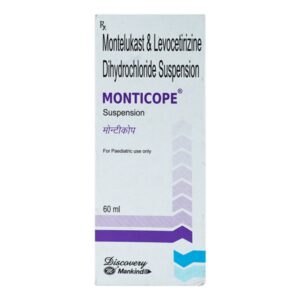Description
About Wikoryl Oral Drops
Wikoryl Oral Drops belongs to the class of medication called ‘cough and cold medications’ primarily used to treat symptoms of the common cold and allergies like sneezing, runny/stuffy nose, fever, headache, body pains, congestion, or watery eyes. The common cold is a respiratory illness affecting the nose and throat. It is mostly caused by viruses known as ‘rhinovirus’. The virus enters the body through the nose, mouth, or eyes and spreads easily through droplets in the air when the person who is sick sneezes, coughs, or talks.
Wikoryl Oral Drops is a combination of three drugs, namely: Paracetamol (mild analgesic and antipyretic), Phenylephrine hydrochloride (decongestant), and Chlorpheniramine maleate (antihistamine/antiallergic). Paracetamol works by inhibiting the production of certain chemical messengers in the brain known as prostaglandins responsible for pain and fever. Phenylephrine hydrochloride works by shrinking the blood vessels in the nasal passage. Thereby providing relief from congestion and decreasing excess mucus production. Chlorpheniramine maleate works by blocking the action of histamine, a substance responsible for causing allergic reactions. It helps to provide relief from symptoms of allergy.
Use Wikoryl Oral Drops as prescribed. Your doctor will recommend how often your child needs to take Wikoryl Oral Drops based on his/her medical condition. Sometimes, Wikoryl Oral Drops may cause common side effects such as drowsiness, nervousness, headache, dizziness, insomnia (difficulty falling or staying asleep), blurred vision, constipation, and dry mouth. Most of these side effects of Wikoryl Oral Drops do not require medical attention and gradually resolve over time. However, if the side effects persist or worsen, please consult your doctor.
If your child is allergic to Wikoryl Oral Drops or any other medicines, please tell your doctor. Please do not give more than the prescribed dose of Wikoryl Oral Drops to your child as it may cause severe liver damage or allergic reactions such as swelling of the face, mouth, and throat, difficulty in breathing, itching or rash.
Uses of Wikoryl Oral Drops
Medicinal Benefits
Wikoryl Oral Drops contains Paracetamol, Phenylephrine hydrochloride, and Chlorpheniramine maleate. Paracetamol is a mild analgesic (relieves pain) and antipyretic (reduces fever) that works by inhibiting the production of certain chemical messengers in the brain known as prostaglandins that are responsible for pain and fever. Phenylephrine hydrochloride is a decongestant that works by contracting and narrowing the blood vessels. Thereby providing relief from congestion and decreasing mucus production. Chlorpheniramine maleate is an antihistamine (anti-allergic drug) that works by blocking the action of histamine, a substance responsible for causing allergic reactions. It helps to provide relief from symptoms of allergy such as sneezing, running nose, watery eyes, itching, swelling, and congestion or stiffness.
Directions for Use
Storage
Side Effects of Wikoryl Oral Drops
- Drowsiness
- Nervousness
- Headache
- Dizziness
- Insomnia (difficulty in falling or staying asleep)
- Blurred vision
- Constipation
- Dry mouth
Drug Warnings
If your child is allergic to Wikoryl Oral Drops or any other medicines, please tell your doctor. Please do not give more than the prescribed dose of Wikoryl Oral Drops to your child as it may cause serious liver damage or allergic reactions such as swelling of the face, mouth, and throat, difficulty in breathing, itching or rash. If your child has chronic bronchitis, asthma, chronic obstructive pulmonary disease (COPD), blockage in the stomach or intestines, pheochromocytoma (tumour in the adrenal glands), kidney, liver, heart or urinary problems, inform your doctor.
Drug Interactions
Drug-Drug Interaction: Wikoryl Oral Drops may interact with anti-allergic drugs (diphenhydramine, cetirizine), antidepressants (duloxetine, escitalopram), anticonvulsants (clonazepam), antianxiety drugs (alprazolam), muscle relaxants (cyclobenzaprine), cough suppressants (dextromethorphan), bronchodilator (albuterol), sleeping agent (ramelteon), pain and fever medicines (paracetamol), pain killers (ibuprofen).
Drug-Food Interaction: Avoid giving Wikoryl Oral Drops with chocolate and caffeine-containing foods such as cocoa beans and tea leaves to your child as they may increase the risk of severity of side effects.
Drug-Disease Interaction: If your child has diabetes, glaucoma, hyperthyroidism (overactive thyroid), chronic bronchitis, asthma, chronic obstructive pulmonary disease (COPD), blockage in the stomach or intestines, pheochromocytoma (tumour in the adrenal glands), kidney, liver, heart or urinary problems, inform your doctor.
Drug-Drug Interactions Checker List
- DIPHENHYDRAMINE
- CETIRIZINE
- DULOXETINE
- ESCITALOPRAM
- CLONAZEPAM
- ALPRAZOLAM
- CYCLOBENZAPRINE
- DEXTROMETHORPHAN
- ALBUTEROL
- RAMELTEON
- PARACETAMOL
- IBUPROFEN
Habit Forming
Diet & Lifestyle Advise
- Wash your child’s hands with soap and water regularly to prevent the spread of germs.
- Eat plenty of foods rich in good bacteria like yoghurt to improve overall health.
- Drink plenty of fluids to avoid dehydration.
- Gargle with salt water for relief from sore throat.
Disease/Condition Glossary
Common cold: The common cold is an infection caused by the virus, mainly known as ‘rhinoviruses’ affecting the nose and throat (upper respiratory tract). Children younger than 6 years are at the most significant risk of colds, but healthy adults can also be affected by having 2-3 colds annually. In most cases, cold symptoms are recovered within a week or ten days. However, symptoms might last longer in people who smoke or are exposed to allergens like pollutants, dust, etc. The symptoms of the common cold include sneezing, sore throat, cough, congestion, mild body pains, low fever, mild headache, feeling unwell, and stuffy or runny nose. In some cases, the discharge from the nose may become thicker and yellow or green, which is not an indication of bacterial infection.
Allergies: These occur when allergy-causing agents (allergens) attack and invade our body, thereby causing the release of histamines. This chemical messenger ‘histamine’ causes swelling, inflammation, redness, itchiness, itchy/watery nose, and watery eyes. Allergies generally occur due to chemicals, air pollution, pet danders, dust, pollen hairs, seasonal allergies like hay fever, etc.






Reviews
There are no reviews yet.